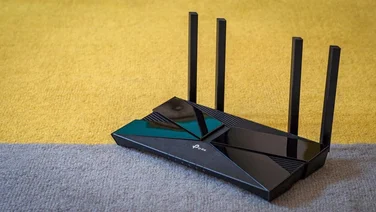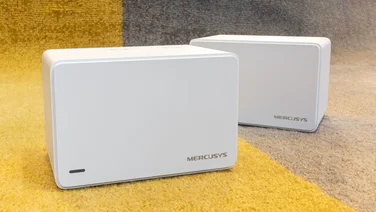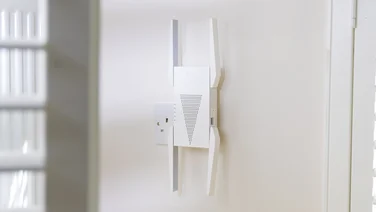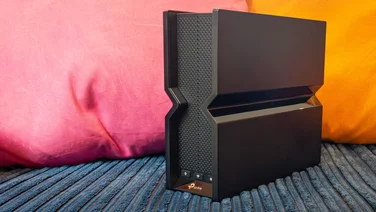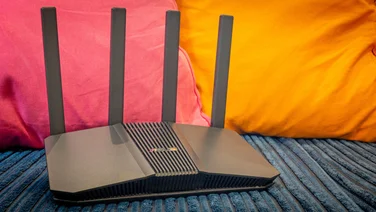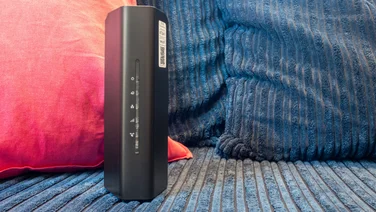To help us provide you with free impartial advice, we may earn a commission if you buy through links on our site. Learn more










- Fast Wi-Fi all through your home
- Self-explanatory management interface
- Built-in modem, phone and smart home hub
- Short on multi-gigabit Ethernet
- Minimal network security features
- Currently only available via pricey import
The Fritz!Box 5690 Pro is no ordinary Wi-Fi 7 router. It comes with integrated modems for both DSL and fibre broadband, plus telephone connectivity and even a built-in Zigbee hub. In theory, it could replace several separate boxes with one central unit.
Not everyone needs that, of course, and UK ISPs aren’t usually geared up to support self-managed equipment (Virgin Media explicitly requires you to use its own supplied hub). Still, there’s also a standard Ethernet WAN port, so you can also connect the Fritz!Box to your existing ISP box just like any other third-party wireless router.
However you set it up, the Fritz!Box 5690 Pro offers fast Wi-Fi 7 with excellent multi-room coverage, plus a handy USB expansion socket and AVM’s highly configurable administration portal. The catch is that right now it’s not officially sold in the UK, but even if you pay for an import model, it’s much cheaper than the market-leading Netgear Nighthawk RS700, making it a great choice for those seeking a future-proof home network.
What you need to know
The Fritz!Box 5690 Pro offers speedy Wi-Fi on the 5GHz band, claiming connection speeds up to 5.8Gbits/sec using the latest Wi-Fi 7 standard with 4×4 MIMO. And the 6GHz band is literally twice as fast, thanks to its 320MHz channel width. The legacy 2.4GHz band only supports Wi-Fi 6 (and earlier standards), but it goes up to 1.2Gbits/sec, so there’s masses of bandwidth to go around.
The router also has four integrated LAN sockets, although these are all limited to gigabit speeds. There is one 2.5GbE-capable port, but if you’re using the router with an ISP-supplied modem then you’ll need to use this socket for the upstream internet connection. That doesn’t ruin the deal – for home use a multi-gigabit LAN connection is a luxury rather than a necessity – but it’s disappointing for the price.
More positively, the router also has a USB-A socket, which can be used to connect and share storage, or to hook up an Android smartphone or 4G/5G adapter for mobile internet services. And if your internet package includes a landline, you can plug a standard DECT handset (or a hub for up to six extensions) directly into the back of the Fritz!Box.










Price and competition
As I’ve already mentioned, the Fritz!Box 5690 Pro isn’t yet officially available in this country, but you can buy an imported unit on Amazon (with an EU plug that will require an adapter) for £381. If you’re not in a rush, it might be worth waiting for a formal UK launch, or picking up a unit on your next holiday: the Fritz!Box online store is currently selling the 5690 Pro within the EU for the equivalent of around £270.
In all cases the Fritz!Box 5690 Pro is a lot cheaper than its closest rival, the Netgear Nighthawk RS700S. This striking black monolith matches the Fritz!Box’s Wi-Fi speeds on the 5GHz and 6GHz bands, and adds an ultra-fast 10GbE LAN socket – but the asking price of £700 is hard to justify.
Other options include our value favourite, the TP-Link Archer BE550. Costing a much more palatable £180, this doesn’t have any fancy built-in telephony or smart home features, and claims only half of the Wi-Fi bandwidth of the 5690 Pro. However, as you’ll see from our tests below, it still provides great whole-home performance, while five 2.5GbE sockets make it a winner for wired connectivity too.
You can squeeze the budget further if you don’t mind some hardware trade-offs. The Netgear Nighthawk RS200 costs £160 but has no 6GHz support, while the Netgear Nighthawk RS100 pulls the price right down to £100 with basic performance and features. If you’re looking for a budget Wi-Fi 7 system we’d be inclined to go for the Asus RT-BE58U instead – it’s a more versatile router, with enough range to suit most homes for just £102.
Features and Design
The Fritz!Box stands upright and wide, like a glossy white crash barrier, measuring 268mm across, 170mm tall and 75mm deep. The dark red trim and jumbo-sized LEDs look a little old-fashioned, like something from the Windows XP era. On the top, two clicky buttons let you toggle the Wi-Fi on and off, and activate WPS pairing for easy connection.
The rear of the router hosts quite an extensive set of connectors, including an SFP port – two modules are included in the box, supporting AON and GPON fibre connections respectively – and a DSL socket supporting VDSL and ADSL2+. An RJ11 connector allows you to plug in a phone (there’s also a TAE socket for German-style handsets), beside which sit the 2.5GbE LAN/WAN socket and four Gigabit LAN ports.










The USB connector is located on the left-hand side, which makes it easy to swap accessories in and out, but since this is not something I often want to do with a router, I’d have preferred it to be hidden away at the back.
In all, the focus is on function over style, and that continues in the management interface. The web portal opens on a text-heavy dashboard showing the status of all connections and ports, with links abounding to the relevant configuration pages. If you find it too busy, you can switch to the “MyFRITZ!” view, which shows a simple overview of telephone activity, NAS status, Wi-Fi status and smart home devices.










Menus in the left-hand pane lead to a wealth of information and options, such as Wi-Fi settings, traffic monitoring and port forwarding – while additional functions hide behind expanding links. Almost every feature is accompanied by an explanatory text in plain English; this can be reassuring, but it does make some configuration pages quite verbose. I’ve never known a router that expects you to do quite so much reading.
Secondary functions include extending the network using additional mesh-compatible Fritz!Box devices, setting up automated routines for connected smart home devices and configuring the NAS service. Interestingly, you don’t necessarily need to plug in a USB drive to use this, as the router has around 1.5GB of internal storage, which you can use to conveniently share small files around your home, or over the internet via FTP.










Parental controls can be applied, too, with individual time limits and schedules for all clients, and I like the ability to generate numeric “tickets” that allow an additional 45 minutes of online time. Specific websites and applications can be blocked on kids’ devices, but there’s no category-based filtering, as found with other router manufacturers.
The Fritz!Box 5690 Pro doesn’t include active network security measures either, although there is a handy one-click tool you can use to audit all your various security settings and check that nothing’s amiss. Other guided tools walk you through processes such as configuring your internet connection, setting up your phones and enabling email notifications for usage statistics and alerts.










Unusually, there’s no single dedicated app for mobile management. Instead, the web interface automatically adapts itself to fit onto a phone screen. This works very well, and avoids the usual frustration of having to work with two different interfaces and feature sets.
There is however a set of five optional companion apps you can download if you wish. MyFRITZ! offers an overview of connected clients, and notifies you when a new one connects, while FRITZ!App Wi-Fi focuses on signal strength, letting you test your network performance and survey other nearby networks. The Fon and Smart Home apps take care of telephony and attached IoT devices, while the FRITZ!App TV handles cable TV services for products that support it (this one doesn’t).










Performance
On paper, the Fritz!Box 5690 Pro is an exceptional Wi-Fi performer: the only router we’ve seen to match its specification is the mighty Netgear Nighthawk RS700.
To see whether the reality lives up to the spec sheet, I tested the router in my usual way. This meant setting up the Fritz!Box 5690 Pro in my study, with an Asustor Drivestor 4 Pro AS3304T NAS appliance attached to one of its gigabit Ethernet sockets. I then wirelessly connected my test laptop – equipped with an Intel BE200 Wi-Fi 7 card supporting 2×2 MIMO – to the Fritz!Box network, carried it to various rooms around my home and measured speeds while copying files to and from the NAS.
Taking advantage of the Fritz!Box’s optional band-splitting feature, I ran the test twice, once using the 5GHz band and then again connecting in the upper 6GHz frequency range. Let’s look first at the 5GHz results, and compare them to the speeds I saw from competing models:
I was disappointed to see that the Fritz!Box’s same-room performance was merely on par with the budget Asus. With other Wi-Fi 7 routers I’ve become accustomed to seeing download speeds above 100MB/sec in the study and adjoining bathroom.
As I continued around the house, however, the Fritz!Box 5690 Pro redeemed itself with excellent breadth of coverage. In the living room its performance held up better than any rival, save for the premium-priced Nighthawk RS700 – and in the bedroom and dining room it raced ahead of all competition.
It was the same story on the 6GHz band. The Fritz!Box again lagged at close quarters, but from a few rooms away it held up far better than other 6GHz-equipped routers:
It’s notable that the 6GHz network was slower in every location than the 5GHz one – presumably a consequence of the fact that higher-frequency radio waves don’t project so effectively through walls and interference.
Even so, the Fritz!Box 5690 Pro’s upper-band network is fast enough for any domestic purpose, and the ability to divide up your devices across two bands lets you get more overall wireless throughput with less network congestion.
AVM Fritz!Box 5690 Pro: Verdict
If you want a Wi-Fi 7 router that’ll natively handle your internet connection, phone line and smart devices all in one unit, the Fritz!Box 5690 Pro is an easy choice. Depending on your specific needs it may indeed be your only option.
Even if you don’t care about those extra features, the Fritz!Box 5690 Pro makes a strong case for itself. The management interface is highly versatile, and more self-explanatory than most. And when it comes to performance, you could argue that this is the best standalone router we’ve ever tested: although it doesn’t deliver the fastest short-range Wi-Fi speeds, the Fritz!Box’s whole-home coverage is a clear cut above the competition.
The main thing that might make you hesitate is the price. It doesn’t feel great to pay £100 more than our European cousins, but AVM hasn’t made any promises as to when (or whether) this router model will get an official UK launch. Even with the import premium, though, the Fritz!Box 5690 Pro is an excellent home networking solution that still costs far less than its nearest rival.


